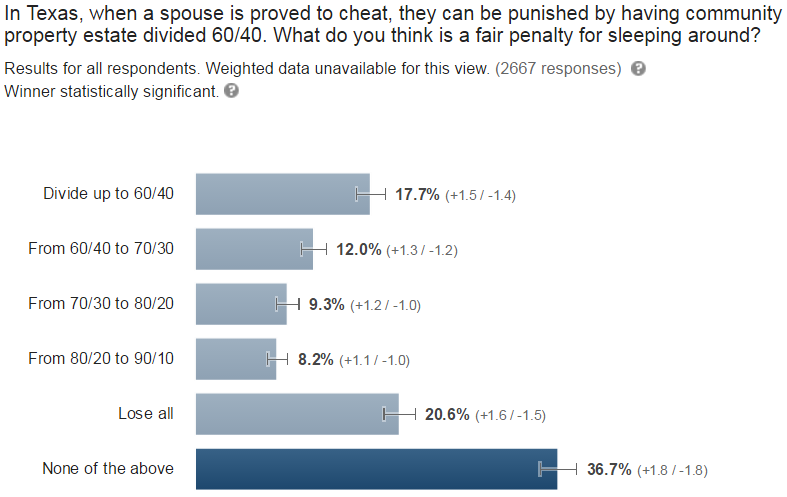Texas is a community property state. What this means is that all property acquired during the course of the marriage is considered to be “community property,” and is therefore subject to equitable division in the event that the couple divorces. In order to find an agreement that is equitable, or “just and right” per Texas’ Family Code, Title I, a court may consider a number of factors, including but not limited to:
- the earning power of each spouse
- which spouse has custody of the children
- marital misconduct or fault (cause of divorce)
To be sure, a court may punish a spouse who has been proven as an adulterer by dividing up community property in a 60-40 ratio.
What do You Think is Fair?
At the Law Offices of Tad Nelson & Associates, our team was curious about what Texans thought about this law. As such, we conducted a survey, where we asked people to respond to the following question:

View the survey results here.
Overall Response Summary
There were a total of 2,667 responses to the survey question. The vast majority of respondents – 36.7 percent – chose “none of the above” as their answer. The next most popular response was that adulterers should “lose all” of their community property – 20.6 percent of people choose this answer. The remaining responses were broken down as such:
- Divide up to 60/40 – 17.7 percent;
- From 60/40 to 70/30 – 12 percent;
- From 70/30 to 80/20 – 9.3 percent; and
- From 80/20 to 90/10 – 8.2 percent.
Male vs. Female Response to the Survey
Responses to the survey highlighted the fact that men and women in Texas may feel very similarly about how married persons in Texas should be punished, in terms of property division, when they commit adultery. This is how each gender group responded to the questions:
- Divide up to 60/40:
-
- Male – 19.3 percent
- Female – 16.2 percent
- Unknown – 16.7 percent
- From 60/40 to 70/30:
-
- Male – 12.4 percent
- Female – 12.7 percent
- Unknown – 9.8 percent
- From 70/30 to 80/20:
-
- Male – 8.5 percent
- Female – 11.4 percent
- Unknown – 7.4 percent
- From 80/20 to 90/10:
-
- Male – 8.4 percent
- Female – 8.8 percent
- Unknown – 6.9 percent
- Lose All:
-
- Male – 19.2 percent
- Female – 22.1 percent
- Unknown – 21.2 percent
- None of the Above:
-
- Male – 32.7 percent
- Female – 33.8 percent
- Unknown – 40.4 percent
Different Ages Responded to the Survey Differently
In general, those in different age brackets have different experiences, needs, and of course – assets. Further, the age of couples who are divorcing can have an extreme effect on issues in divorce; for example, older couples may be more concerned with asset division, whereas younger couples may be more concerned with things like child custody. The distinction in values was reflected in the respondents’ answers to the survey question.
The age group who voted for the “lose all” option the most were those survey participants aged 35-44 (22.7 percent). Surprisingly, those who voted for this answer the least were those ages 18-24 (17.4 percent). Equally as interesting, it was also this age group – those ages 18-24 – who were least likely to choose the “none of the above” option; 23.6 percent of responses in this category were submitted by this age group. On the other hand, those who are 65 years of age or older were most likely to choose “none of the above,” with 49.1 percent of 65+-year-olds choosing this option.
Income Affected Choice
One of the biggest distinguishing demographics related to survey question response was income. Of respondents who chose the “from 60/40 to 70/30 option,” a whopping 36 percent of them were in an income bracket of $150,000 per year or more. On the other hand, of those who chose the “none of the above option,” 32.4 percent of them only make up to $24,000 per year. The none of the above option was also a favorite of those who make between $50,000 and $74,000 per year; 36.5 percent of responses in this category were from this group.
Dividing Community Property in Texas
What is clear from the survey is this: individuals do not always agree with how the courts decide to divide property, and many feel as though the law should be different. If you are going through a divorce, a Houston family lawyer can help you to secure the best outcome for you regarding property division. Contact a Houston divorce attorney at the Law Offices of Tad Nelson & Associates for a consultation today.